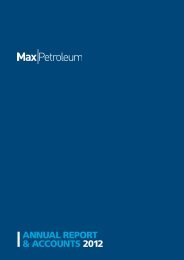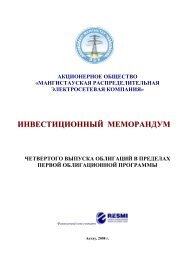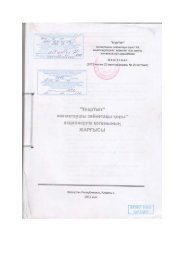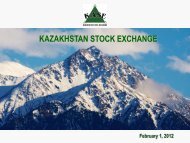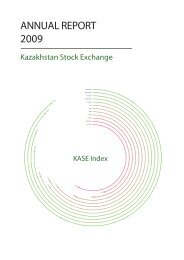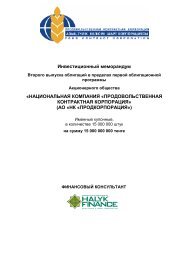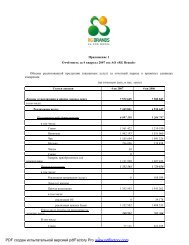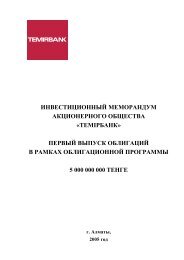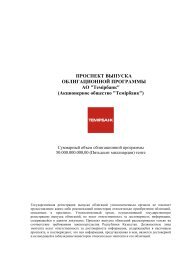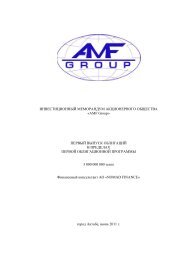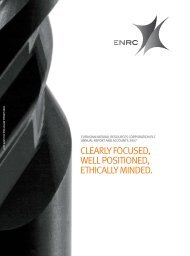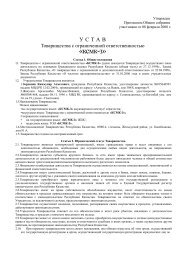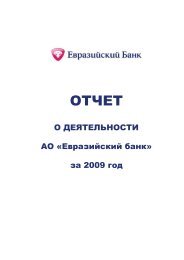JPMorgan - KASE
JPMorgan - KASE
JPMorgan - KASE
Create successful ePaper yourself
Turn your PDF publications into a flip-book with our unique Google optimized e-Paper software.
In 2001, we exported approximately 50% of our crude oil production and transferred<br />
approximately 43% of our crude oil production to our refining facility at Shymkent. The<br />
remaining 7% of our crude oil was sold domestically for cash or to the Kazakhstani government<br />
as payment-in-kind in satisfaction of a portion of our royalty payment obligations. The majority<br />
of our export sales were FCA sales to third parties within Kazakhstan, normally at the rail<br />
terminal at Tekesu, adjacent to the Shymkent refinery, but in late 2001 we began transitioning to<br />
FOB sales, where we arrange, and bear the obligations for, the transportation of the crude oil to<br />
the shipping port. We are also concluding contracts on DAF, CPT and CIF terms, where we also<br />
arrange, and bear the obligations for, transportation. The principal buyers of our crude oil<br />
include Naftex, Eurasia, TotalFinaElf, BP, Vitol, Sintez and Shell. Crude oil production from our<br />
producing fields is and will continue to be the primary source of crude oil for the Shymkent<br />
refinery. The refined products produced at Shymkent include heating fuel, gasoline, diesel fuel<br />
and jet fuel primarily for the Kazakhstani domestic market.<br />
The quality of our oil properties in Kazakhstan has allowed us to increase our production from an<br />
average of approximately 44,000 BOPD in the year ended June 30, 1997 to 128,203 BOPD in the<br />
nine months ended September 30, 2002. However, dependence on a single customer, the<br />
Shymkent refinery, for the sale of our oil production was a significant strategic weakness,<br />
restricting production, preventing us from achieving an optimum price for our crude and<br />
compromising the achievement of our growth potential. As a result, management determined<br />
that it was imperative that our Upstream operations be combined with the Shymkent refinery as<br />
well as the other downstream assets of HOP, which was the owner of the Shymkent refinery.<br />
Pursuant to the HOP acquisition, we acquired, on March 31, 2000, a significant interest in HOP,<br />
which was a domestic Kazakhstani downstream company. We subsequently transferred our<br />
interest in HOP to Valsera, a wholly-owned subsidiary, and we transferred Valsera to HKM on<br />
March 31, 2002. See “Business and Properties — The HOP Acquisition”. In addition to the<br />
refinery, which is the newest refinery in Kazakhstan and strategically located in southern<br />
Kazakhstan, other assets acquired through the HOP acquisition include a marketing and trading<br />
operation comprised of a network of distribution centers along with several retail gasoline<br />
outlets.<br />
Our new Downstream organization is accountable for maximizing the value of our crude oil<br />
production through increasing the number of options for exporting oil, reducing the cost of<br />
transporting oil to export markets, executing market-driven strategies for petroleum products<br />
marketing and trading and optimising the performance of the Shymkent refinery.<br />
History of HOP<br />
The Shymkent refinery was registered by the Kazakhstani government in November 1985, and its<br />
processing plants were commissioned between 1985 and 1987. In 1993, the Shymkent refinery<br />
was reorganized into the joint stock company, OJSC Shymkentnefteorgsyntez, now known as<br />
Hurricane Oil Products OJSC. In July 1996, the Kazakhstani government privatised HOP by selling<br />
all of its common shares of HOP to Kazvit Holdings Limited, a company affiliated with KKB. In<br />
January 1998, CAIH purchased the HOP common shares from Kazvit and all of Kazvit’s obligations<br />
under the HOP privatisation agreement, including the capital investment commitments<br />
thereunder. Concurrent with the completion of our acquisition of HOP, the HOP privatisation<br />
agreement and the obligations thereunder, including the capital investment commitments, were<br />
assigned to us. We recently transferred direct ownership of HOP to Valsera, an intermediate<br />
holding company which was wholly and directly owned by us, and then transferred Valsera to<br />
HKM, together with our rights under the HOP acquisition and privatisation agreements.<br />
The HOP Privatization Agreement<br />
As part of the HOP acquisition, we assumed all of the rights and obligations under the HOP<br />
privatization agreement, being the agreement whereby the government of Kazakhstan<br />
privatized HOP. Under that agreement, we were required to invest, or cause HOP to invest, a<br />
minimum of the Tenge equivalent of $150 million on or before December 31, 2001 in capital<br />
74



